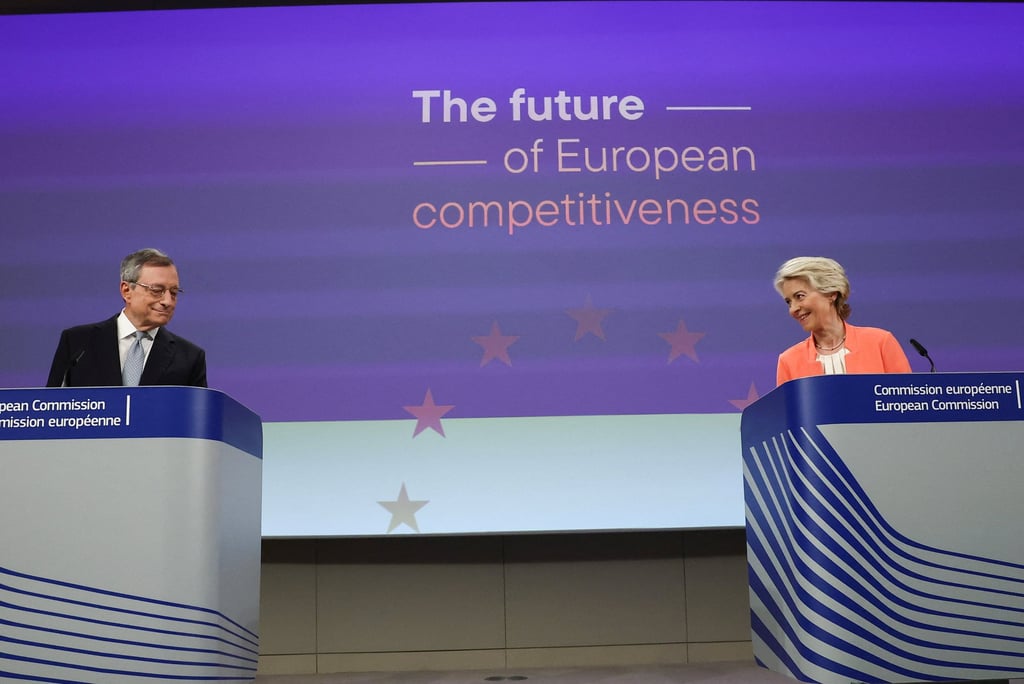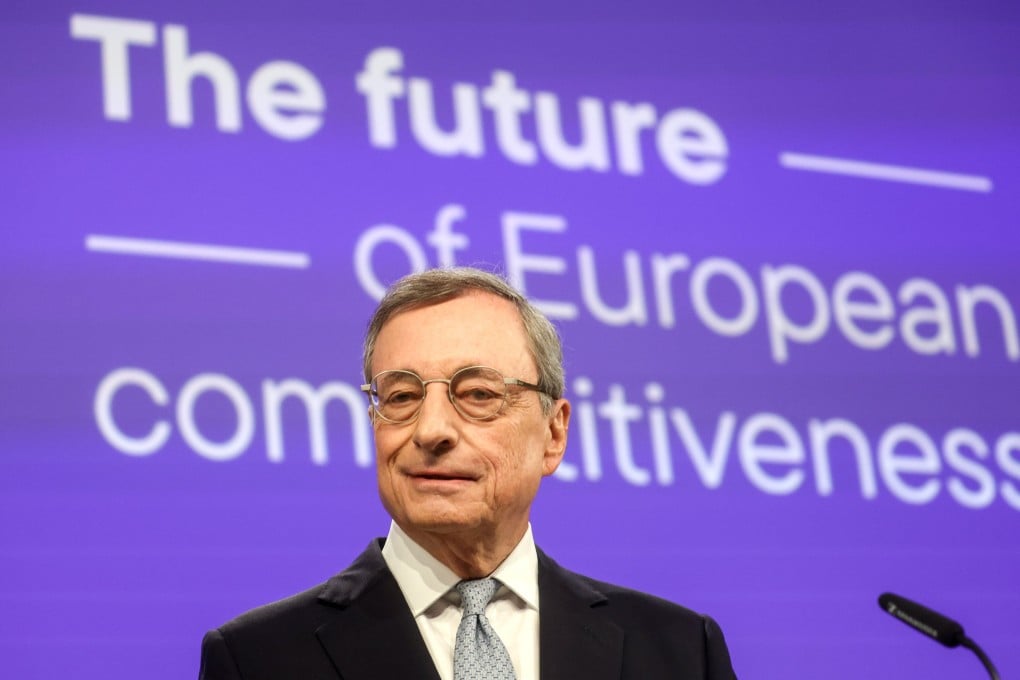Draghi Says EU Itself at Risk Without More Funds, Joint Debt
‘Super Mario’ Draghi calls for €800 billion to ensure EU competes with US and China
‘We can’t be softer or harder across the board’ on China, Draghi says, as he calls for ‘tactical’ EU trade policy in long-awaited report
That is the advice from Mario Draghi, the venerated former Italian leader who has, for a second time, been drafted to save the European economy from oblivion.
Tasked a year ago with drawing up a blueprint for the “future of European competitiveness”, the man who – when at the helm of the central bank – was dubbed “Super Mario” for helping drag the bloc out of its debt crisis from 2011, was unequivocal about the scale of the challenge.
“If Europe cannot become more productive, we will be forced to choose. We will not be able to become, at once, a leader in new technologies, a beacon of climate responsibility and an independent player on the world stage. We will not be able to finance our social model. We will have to scale back some, if not all, of our ambitions,” he wrote.
- He proposed an investment hike to around 5 per cent of gross domestic product (GDP) to “levels last seen in the 1960s and 70s” if Europe was to digitize, decarbonize and increase its defense capacity in line with his assessments.
- “This is unprecedented: for comparison, the additional investments provided by the Marshall Plan between 1948-51 amounted to around 1-2 per cent of GDP annually,” Draghi wrote.
- This level of funding is essential if Europe is to bridge the innovation gap with the US and China, particularly in hi-tech sectors.
Europe’s decarbonization efforts should be an engine for growth, not an exercise in bureaucracy, he added.
Asked whether his report meant Europe should become tougher on China, Draghi suggested that it needed to be smarter.
- “Trade policy has to be pragmatic … you asked me, softer or harder? We can’t be softer or harder across the board. We have to look at specific sectors, and decide what we want to do,” he said.
- “China is actually slowing very much, but it’s become much less open to us, and it’s actually competing with us in global markets,” he added.
An example of that pragmatism would be refraining from imposing tariffs on Chinese solar panel imports, where European industry stands no chance of competing, Draghi said. In his report, he described the extra costs on consumers in such instances as “deadweight”.
The former Italian prime minister painted a gloomy picture of both the global geopolitical scenario and Europe’s prospects if it did not act urgently to turbo-boost productivity.
“The EU exists to ensure that Europeans can always benefit from these fundamental rights. If Europe can no longer provide them to its people – or has to trade off one against the other – it will have lost its reason for being,” he said.
The EU’s 27 members must therefore collaborate closely on buying, mining and pooling critical minerals, amid dominance from China and a global race for untapped resources around the world, Draghi said. This would require a “genuine foreign economic policy”, whereby the EU pursues trade and investment deals depending on its own resource requirements.
The need for reform, as painted in the lengthy report, is stark. Amid sluggish productivity growth, the average European citizen’s income has grown at around half that of their American counterpart since 2000, while European businesses are being outflanked by rivals from both China and the US.
According to the report, “the share of sectors in which China is directly competing with the euro area exporters is now close to 40 per cent, up from 25 per cent in 2002”.
Only four European companies are among the world’s top 10 tech firms, while many unicorn companies founded in Europe jump to the US and other markets due to EU regulators’ habits of “hindering innovation”.
“The threat to Europe’s position in clean tech owes mainly to a lack of an industrial strategy equivalent to other major regions,” Draghi wrote.
Where long-term decarbonisation policies have been adopted, they are not underpinned by industrial strategy, Draghi found. This has resulted in the disjointed dynamic whereby the EU has ordered the phase-out of tailpipe emissions by 2035 without “following up these ambitions with a synchronised push to convert the supply chain” to electric vehicles.
The report will tell the policymaking direction of the next five years under European Commission President Ursula von der Leyen, the German politician confirmed, suggesting a rocky few years for China, defined by the conflation of economic and security concerns.







No comments:
Post a Comment